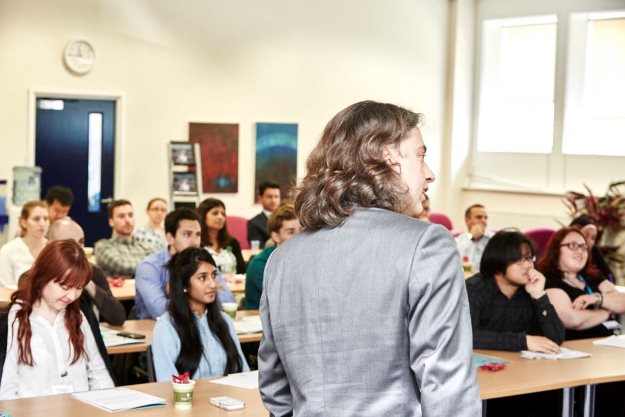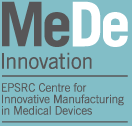1st MeDe Innovation Early Career Researchers Forum Workshop

May 19, 2015
In January 2014 we launched an early career researcher forum to foster the professional development of tomorrow’s rising stars in innovative manufacturing in medical devices. Since then, the forum has grown beyond the five centres and welcoming national researchers with an interest in innovative manufacturing in medical devices.
This month’s blog post comes from Dr Maria Katsikogianni, Research and Knowledge Transfer Development Officer at the Centre for Advanced Materials Engineering at the University of Bradford. Together with Dr Marlene Mengoni (University of Leeds), these two MeDe Innovation ECR Ambassadors hosted their own ECR workshop:
On Monday 11th May 2015, the University of Bradford hosted the first MeDe Innovation Early Career Researchers (ECRs) Forum Workshop to highlight the latest in research undertaken by the Universities of Leeds, Newcastle, Nottingham, Bradford and Sheffield in the area of musculoskeletal medical device manufacture. Fifty representatives from the five MeDe innovation academic centres, industry, and a handful of researchers from other institutes interested in innovative medical device manufacture registered to attend the event.
After a welcoming introduction by Professor Phil Coates, the Director of the Advanced Materials Engineering Centre at the University of Bradford and Marlène Mengoni, an ECR Forum Ambassador based at the University of Leeds, the event consisted of 3 sessions, networking opportunities and a lab tour.

Key Research in the MeDe Innovation Academic Centres
The first session focused on current research undertaken by each University into the areas of manufacturing at the point of need and stratified design and manufacture towards biomedical applications.
Natacha Rivera Rodrigues (Newcastle University) opened the workshop with a fascinating description of research challenge 2 – Manufacturing at the Point of Need. Natacha described how this flagship can be split into two projects. Project A is about minimally invasive implantation of bioactive materials and consists of delivering these materials through an arthroscope, with current studies relying on in-situ photocurable systems to form mechanically suitable resorbable scaffolds, while Project B is about processes for in clinic manufacture and has two research challenges; 1) new processing technologies for the production of rigid scaffolds pre-seeded with autologous patient material and 2) in clinic manufacture and configuration of bioactive devices for large defects which are load bearing, biologically enhanced and functionally graded.
Miquel Gimeno-Fabra (University of Nottingham) followed with a detailed presentation that covered the research activities that take place at the Advanced Materials group. Miquel described how these can be divided into three areas; phosphate glass as a bioresorbable material, plasma technologies for novel surface modification and sputtering of thin films, nanomaterials-polymer composites for biomedical applications, and gave a short summary of the instruments and expertise available at Nottingham, along with the areas they believe they could benefit from further collaborations within MeDe ECRs.
Ilida Ortega Asencio and Piergiorgio Gentile (University of Sheffield) gave a general overview of the projects the team is involved within MeDe. Ilida highlighted the facilities and expertise on offer for the MeDe partners while Piergiorgio talked about how his work aims to investigate both biomimetic processing and layer-by-layer manufacturing to produce functionalised composite membranes that can be used as innovative medical devices to tailor surface functionality including enhanced osseointegration.
Hazel Fermor (University of Leeds) followed with a description of the manufacturing process to produce a decellularised xenogeneic osteochondral scaffold for the regeneration of cartilage defects. Hazel described how the low friction, load bearing functions of cartilage can be recapitulated by retaining the highly complex composition and architecture of the natural extracellular matrix while further studies are in progress to optimise the geometric design of the scaffolds.
Maria Katsikogianni (University of Bradford) concluded the session by describing how the integration of microscopies used in biological research, such as the confocal scanning laser microscopy, with atomic force microscopy, has revolusionalised the use of microscopy in the biomedical sciences. By providing a nanomechanical “finger” that can directly probe the mechanical properties of cells, tissues, materials etc., while allowing simultaneous measurements of signaling, gene expression and structural remodeling, the characterisations of materials and the interface at the nanolevel enable cell-material interactions interpretation and a better material design.

Career Pathways
This session focused on career pathways described by two invited speakers.
Harry Tsoumpas, a lecturer in Medical Imaging since 2013 (University of Leeds) opened the session with a talk about “The curious case of modern researchers”. Through a fascinating presentation, Harry initially discussed the common straggles of a scientist in the scientific arena and in the second part of his presentation he described his concerns along with his aspirations about the potential future of researchers and their role in the acceleration of scientific discoveries as a mean of addressing key societal challenges.

Sami Tarsuslugil, a research bioengineer since 2014 (JRI Orthopaedics Ltd.) gave a talk about the transition from academia to industry. Through a very interesting and detailed presentation, Sami described when and why he took the decision to work for a company, the similarities and differences between his job in industry and the one as a postdoctoral researcher, how businesses address manufacturing issues and value early-stage MedTech development projects, while he advised everyone to have a spell in industry towards developing complementary skills and actually implementing them in own work.

Networking Opportunities
The lunch time break provided an opportunity for delegates from across the five MeDe innovation academic centres and the invited speakers to exchange information and ideas about sharing research facilities and expertise but also to debate the challenges researchers face in industry and the academia.



Early Career Researchers of MeDe Innovation
16 early career researchers from the five MeDe innovation academic centres had the opportunity to present lightning talks about their background, their research and the expertise/facilities they can offer, and also what they are looking for. This session highlighted the current research but also collaborations that can be further established amongst the five centres, strengthening their links and their potential.
Lab Tour
The attendees were divided into two groups for the tour and hosted by Dr Cristina Tuinea-Bobe, Dr Yulia Ryabenkova, Dr Dimitrios Vgenopoulos and Dr Maria Katsikogianni in the labs of the Advanced Materials Engineering at the University of Bradford and in particular in the labs of Polymer Micro and Nanotechnology, Clean room, Die Drawing, and Materials, Tissues and Cells Characterisation at the nanolevel using Confocal-AFM and Nanoindentation.
Closing
Marléne Mengoni (University of Leeds) used the concluding session to collect feedback and to announce further MeDe workshops and lab visits.

The message from the discussions was that excellent science, sharing of the resources and expertise and face to face communication is integral between ECRs. The fascinating presentations given by the two invited speakers; Harry Tsoumpas and Sami Tarsuslugil, further enhanced the ECRs awareness of career pathways but also of the translation process from the bench to the bedside.
